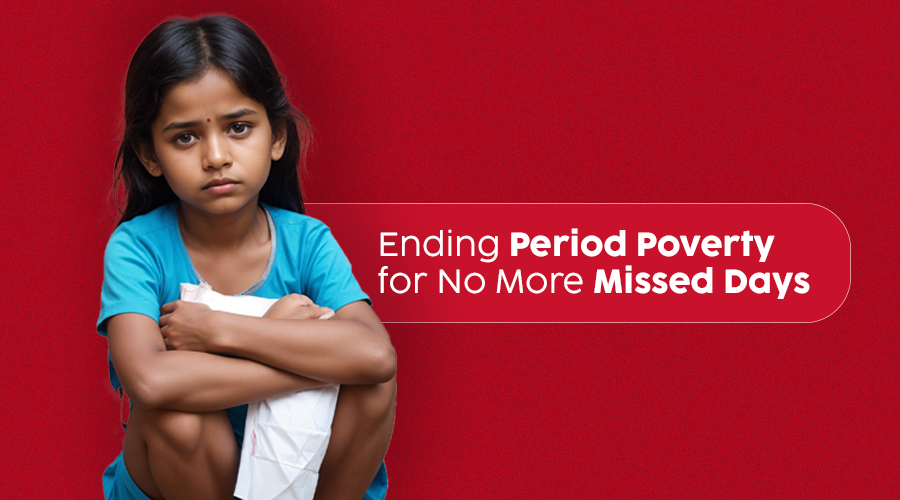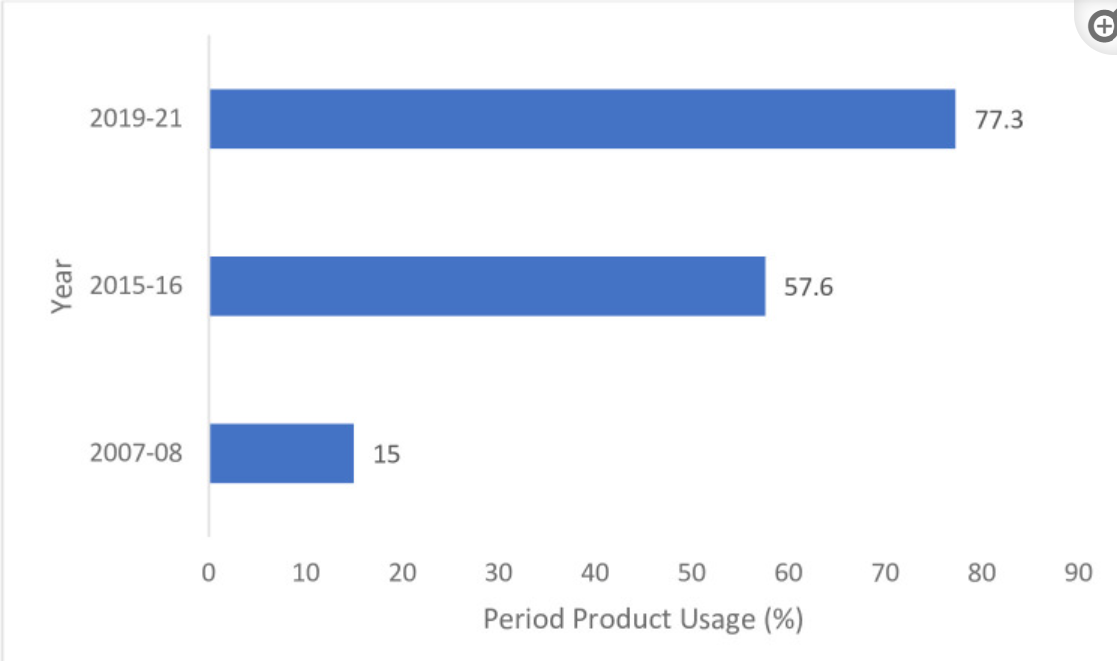Imagine this: It’s the end of the month and you feel the onset of your period. You manage to buy period essentials without much struggle. Now, consider a girl from a poor strata of society who struggles to afford menstrual hygiene products. Her school probably doesn’t have washrooms. With no other option, she skips school. She resorts to using a makeshift, unhygienic solution, feeling uncomfortable, thereby becoming susceptible to infections.
This distressing experience is not just a one-off inconvenience; it is a daily reality for millions who face period poverty. For them, the lack of access to proper menstrual care is a significant barrier to education, health, and dignity, perpetuating a cycle of hardship and inequality.
Period poverty, a silent yet pervasive issue, robs millions of individuals of their dignity and basic rights every month. Defined as the lack of access to menstrual hygiene products, proper sanitation facilities, and menstrual education, period poverty affects people of all ages, genders, and socioeconomic backgrounds. Despite being a fundamental aspect of human health and dignity, periods continue to be shrouded in stigma and shame, exacerbating the challenges faced by those already marginalized. Let’s explore the landscape of period poverty, shedding light on its statistics and actionable ways to combat this pressing issue.
Period Poverty As of Now:
Across the globe, period poverty remains a harsh reality for millions, perpetuating cycles of poverty and inequality. According to UNESCO, approximately 1 in 10 girls in Sub-Saharan Africa miss school during their menstrual cycles due to inadequate menstrual hygiene management facilities. In some regions, this can translate to as much as 20% of the school year lost, directly impacting girls’ educational attainment and opportunities for economic empowerment.
Moreover, access to menstrual hygiene products is a luxury that many cannot afford. The cost of sanitary pads or tampons can be prohibitive for individuals living in poverty, forcing them to resort to unhygienic alternatives such as rags, newspapers, or even leaves. This not only poses serious health risks, including infections and reproductive health complications but also perpetuates the stigma surrounding menstruation. As per UNWomen data, at least 1 in 10 women and girls in rural areas across 12 countries did not have a private place to wash and change during their last period.
In India, according to the most recent National Family Health Survey (2020-21), though the usage of period products has increased, yet more than 30 % of women between the ages of 15 and 24 in India do not use hygienic methods of protection during their menstrual periods. Hygienic methods, which include locally prepared napkins, tampons, and menstrual cups, remain inaccessible to a significant portion of the population. While the data indicates a 20 % increase in the use of hygienic methods over the past seven years, progress is uneven. Only 14 states report that more than 90 percent of women use hygienic methods of menstrual hygiene management (MHM). This highlights the ongoing need for increased accessibility, awareness, and education to ensure all women can manage their menstruation safely and with dignity.
Furthermore, cultural taboos surrounding menstruation exacerbate the challenges faced by Indian women and girls. Menstruation is often considered impure or shameful, leading to social ostracization and discrimination. In many households, menstruating individuals are prohibited from entering certain spaces, cooking, or even touching certain objects, further perpetuating the stigma surrounding periods.
Actionable Solutions for Addressing Period Poverty:
Addressing period poverty requires a multi-faceted approach that tackles both the immediate need for menstrual hygiene products and the underlying socio-cultural barriers. Here are some actionable solutions:
Access to Menstrual Hygiene Products:
Governments and non-profit organizations must work together to ensure that menstrual hygiene products such as sanitary pads and tampons are affordable and accessible to all. Since the removal of the “pink tax” on period products in 2018, these essentials have become more affordable, yet the efforts must not stop there. Policy-level changes are imperative to mandate the availability of affordable period products in public restrooms, schools, and office dispensaries. This can be achieved through subsidy programs, distribution drives, and partnerships with local manufacturers. Few of the Govt. initiatives that have improved menstrual hygiene in India are:
Menstrual Hygiene Scheme – MHS (2010), Rashtriya Kishor Swasthya Karyakram – RKSK (2014) and Nirmal Bharat Yatra (2012)
Menstrual Education:
Comprehensive menstrual education programs should be integrated into school curriculums to break the silence and stigma surrounding periods. By providing young people with accurate information about menstruation, we can empower them to make informed choices and challenge harmful stereotypes.
Improved Sanitation Facilities:
Access to clean and private sanitation facilities is essential for managing menstruation with dignity. Governments should invest in the construction of gender-sensitive toilets equipped with proper disposal facilities for menstrual waste.
Community Engagement:
Engaging communities in conversations about menstruation is crucial for challenging deeply ingrained taboos and stereotypes. By fostering open dialogue and creating safe spaces for discussion, we can break down barriers and promote acceptance and understanding.
Economic Empowerment:
Empowering women economically is key to addressing period poverty in the long term. By providing women with opportunities for employment, education, and entrepreneurship, we can help them break free from cycles of poverty and gain access to essential resources.
Key Takeaway:
Period poverty not only causes severe health complications but also hinders the progress of any nation. Ending period poverty can begin at home, where individual actions can create profound change. By donating period supplies or offering financial support to those in need, we can collectively eradicate this issue, creating a world where menstruation is no longer a barrier to education, health, and gender equality. It is time to break the silence, challenge the stigma, and ensure that every individual has the right to manage their periods with dignity and respect. Together for a World with No More Missed Days!
Sources:
● https://blogs.worldbank.org/en/education/menstrual-health-and-hygiene-what-role-can-schools-play






